When you have an abundance of popcorn or want to plan snacks for a future movie night, the question of whether popcorn can be frozen might come to mind. Freezing is a common method of prolonging the shelf life of many foods, and it’s natural to wonder if popcorn can withstand the freezing process without losing its quality or taste. There are different approaches to consider depending on whether you’re dealing with unpopped kernels or already popped popcorn.

Understanding the right techniques to freeze popcorn is essential to maintain its freshness and flavor. For unpopped kernels, the process is fairly straightforward and can extend their popping potential significantly. However, freezing popped popcorn requires careful packaging to prevent it from becoming stale or soggy when defrosted. Throughout this article, common queries about freezing popcorn are addressed to ensure you can enjoy your popcorn to the fullest.
Key Takeaways
- Popcorn, both unpopped and popped, can be frozen to extend its consumable life.
- Proper packaging is crucial to maintain the quality of frozen popcorn.
- Common questions about freezing popcorn are answered to guide you through the process.
Basics of Freezing Popcorn

When you freeze popcorn, you aim to preserve its freshness and extend its shelf life while trying to maintain its original texture and flavor.
Effects on Texture and Flavor
Freezing popcorn can cause changes to its texture and flavor. Moisture from the freezing process may soften the popcorn, potentially making it less crisp upon thawing. The flavor can also be affected; it may become more muted, as freezing can dull the taste buds’ perception of flavor.
Proper Storage Methods
To freeze popcorn effectively:
- Use airtight containers or freezer bags: This minimizes exposure to air and prevents freezer burn.
- Remove as much air as possible: Sealing a freezer bag? Squeeze out extra air before you seal it.
- Label containers: Write the date of freezing on the container so you can keep track of how long it’s been stored.
Storing your popcorn in the freezer can help preserve it for 2-3 months. Remember to check for freshness when you take it out to enjoy later.
Freezing Unpopped Kernels

When it comes to extending the shelf life of popcorn kernels, freezing is a viable option. Below, you will find specific guidance on how to freeze unpopped popcorn kernels and the proper way to thaw them for future use.
Best Practices for Freezing
To ensure optimal freshness:
- Choose airtight containers or freezer bags: The less air around the kernels, the better.
- Label with the date: Keeping track of when you freeze your kernels helps manage inventory.
Here’s a step-by-step process:
- Measure: Portion the kernels according to your typical usage.
- Package: Put the kernels into your chosen airtight container.
- Seal: Remove as much air as possible to prevent freezer burn.
- Freeze: Place the container in the deepest part of the freezer.
Thawing Process
When you’re ready to pop your kernels:
- Thaw at room temperature: Simply remove the desired amount from the freezer.
- No need to defrost: Kernels can go straight from the freezer to the popper if desired.
Remember not to refreeze kernels after thawing to maintain quality.
Freezing Popped Popcorn

You can extend the life of your popcorn by freezing it, ensuring you have a ready-to-eat snack for later. The process is straightforward, and with proper storage, your popcorn can retain its taste and texture.
How to Freeze Cooked Popcorn
To freeze your cooked popcorn, follow these steps:
- Ensure your popcorn is completely cool before you begin packing. It must be room temperature to prevent moisture build-up which can lead to sogginess.
- Choose an airtight container or freezer bag for storage.
- Containers should be rigid and sealable.
- Freezer bags should be durable and suitable for food storage.
- Divide the popcorn into serving sizes if you find it convenient. This step helps so you can defrost only what you will eat.
- Label your container or bag with the current date, so you will know how long it has been in the freezer.
- Place the container or bag in the freezer, making sure it lies flat to save space.
Reheating Frozen Popcorn
When you’re ready to enjoy your frozen popcorn, here’s how to reheat it:
- Remove the popcorn from the freezer and let it sit at room temperature for a few minutes. This helps to separate pieces that might have stuck together.
- Preheat your oven to about 250 degrees Fahrenheit (120 degrees Celsius).
- Spread the popcorn on a baking sheet in a single layer.
- Warm the popcorn for a few minutes in the oven.
- Check frequently to make sure it is warming evenly but not burning.
- The goal is to remove moisture, not to cook it further.
Remember, microwaving is not recommended as it tends to make the popcorn chewy.
Frequently Asked Questions

When preserving popcorn’s freshness, proper storage is crucial. Explore these common queries to ensure your popcorn stays delicious and enjoys maximum shelf life.
How should popcorn be stored to maximize its shelf life?
To maximize shelf life, store popcorn in an airtight container at room temperature. Keep it away from moisture and heat sources to prevent it from becoming stale.
Is it possible to freeze caramel or kettle corn without affecting the quality?
You can freeze caramel or kettle corn, but be aware that moisture can affect the texture. Store it in airtight containers or freezer bags to maintain quality.
What is the maximum duration for keeping popcorn fresh in the freezer?
Popcorn can be kept fresh in the freezer for up to two to three months. After this period, while still safe to eat, its quality may decline.
Does the freezing process have an impact on the popping quality of popcorn?
Freezing unpopped kernels does not significantly impact their popping quality. Ensure they are dry and stored in an airtight container to maintain moisture levels.
Are there any special considerations for freezing bags of microwave popcorn?
Avoid freezing microwave popcorn as the moisture content and oils can become rancid or lead to soggy results upon thawing.
What are the signs that popcorn has gone bad, and how can you prevent it?
Signs that popcorn has gone bad include a rancid smell, a change in texture, and a stale taste. Keep it dry, sealed, and consume it before the recommended freezer time to prevent spoilage.
